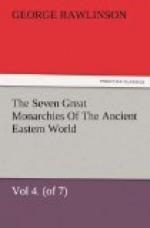But it was otherwise in the far south-west. Here the Empire bordered upon Egypt, a rich and populous country, which at all times covets Syria, and is often strong enough to seize and hold it in possession. The natural frontier is moreover weak, no other barrier separating between Africa and Asia than a narrow desert, which has never yet proved a serious obstacle to an army. From the side of Egypt, if from no other quarter, Babylonia might expect to have trouble. Here she inherited from her predecessor, Assyria, an old hereditary feud, which might at any time break out into active hostility. Here was an ancient, powerful, and well-organized kingdom upon her borders, with claims upon that portion of her territory which it was most difficult for her to defend effectively. By seas and by land equally the strip of Syrian coast lay open to the arms of Egypt, who was free to choose her time, and pour her hosts into the country when the attention of Babylon was directed to some other quarter. The physical and political circumstances alike pointed to hostile transactions between Babylon and her south-western neighbor. Whether destruction would come from this quarter, or from some other, it would have been impossible to predict. Perhaps, on the whole, it may be said that Babylon might have been expected to contend successfully with Egypt—that she had little to fear from Arabia—that against Persia Proper it might have been anticipated that she would be able to defend herself—but that she lay at the mercy of Media. The Babylonian Empire was in truth an empire upon sufferance. From the time of its establishment with the consent of the Medes, the Modes might at any time have destroyed it. The dynastic tie alone prevented this result. When that tie was snapped, and when moreover, by the victories of Cyrus, Persian enterprise succeeded to the direction of Median power, the fate of Babylon was sealed. It was impossible for the long straggling Empire of the south, lying chiefly in low, flat, open regions, to resist for any considerable time the great kingdom of the north, of the high plateau, and of the mountain-chains.




